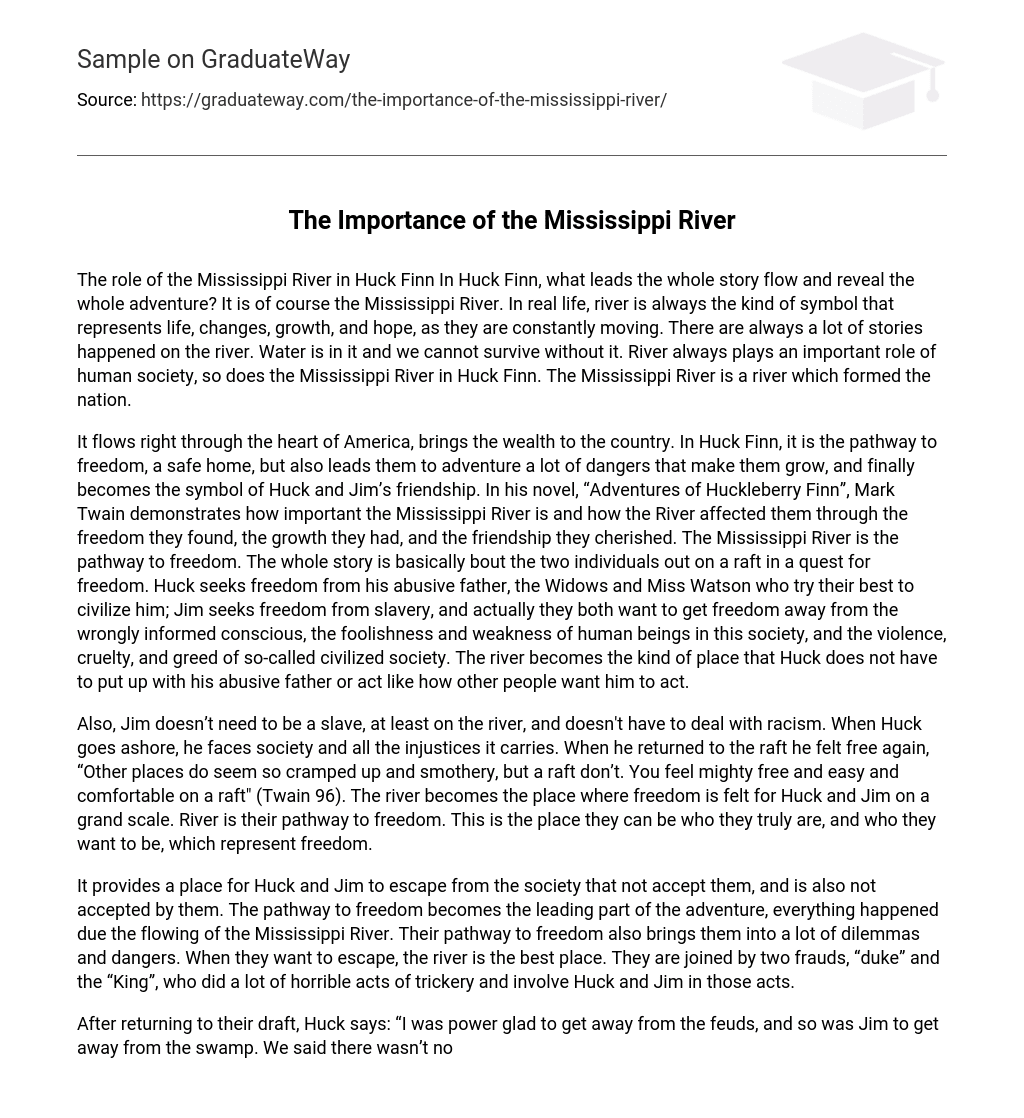The role of the Mississippi River in Huck Finn is crucial as it drives the entire story and uncovers numerous adventures. In both fiction and reality, rivers are symbolic of life, transformation, progress, and optimism due to their constant movement. The river serves as the backdrop for countless stories. It carries water, an essential element for our survival, and holds significant significance in human society. Similarly, the Mississippi River holds immense importance in Huck Finn’s narrative as it represents a river that shaped the nation.
The Mississippi River is a crucial element in Mark Twain’s novel, “Adventures of Huckleberry Finn”. It represents freedom, personal growth, and friendship for the characters. The river allows Huck and Jim to escape oppressive forces and seek liberation from physical restraints as well as societal ignorance and cruelty. Through their journey on a raft, they navigate their way towards newfound freedom. Both Huck and Jim desire to be free from oppressive forces such as Huck’s abusive father and Widow/Miss Watson’s attempts to impose civilization upon him. Jim yearns for freedom from slavery. Beyond physical restraints, they aim to escape societal ignorance, violence, cruelty, greed, and an unjust “civilized” society. Ultimately, the river becomes a sanctuary where Huck can find refuge from his abusive father and societal expectations.
Both Jim and Huck experience different levels of freedom while on the river. Jim doesn’t have to endure slavery or racism, whereas Huck must confront societal injustices when he ventures ashore. However, once back on the raft, Huck regains his sense of liberation. Unlike other places which feel constricting and oppressive to him, being on a raft makes him feel remarkably free and comfortable. For both characters, the river represents an abundant source of freedom—a pathway where they can truly embrace their true selves and embody the essence of liberty.
The Mississippi River acts as a refuge for Huck and Jim, serving as a means of escape from the unaccepting society that they belong to and do not accept in return. This river becomes the catalyst for their adventure, as it leads them towards freedom. However, this pathway to freedom also exposes them to various dilemmas and dangers. Whenever the desire to escape arises, the river proves to be their best option. Along their journey, they encounter two con artists known as the “duke” and the “King” who involve Huck and Jim in their deceitful schemes.
After returning to their draft, Huck expresses his happiness by stating, “I was power glad to get away from the feuds, and so was Jim to get away from the swamp. We said there wasn’t no home like a raft after all. Other places do seem cramped up and smothery, but a raft don’t. You feel mighty free and comfortable on a raft”(107). Similar to the river drifting, Huck’s life is surrounded by the unknown and uncertain yet still holds a sense of freedom. While the Mississippi River leads them to freedom, it also exposes them to dangers and the very obstacles they are trying to flee. Nonetheless, the river acts as a safe haven for Huck and Jim because it remains a constant home despite the hardships they face.
Throughout their journey, they found solace in the towns along the river. Returning to the river symbolized a return to freedom and safety, reminiscent of their newfound home. This journey had a profound impact on Huck’s moral compass as he gained an understanding of the significance of honesty and began contemplating the moral implications of the good and bad experiences he witnessed. Motivated by these realizations, Huck vowed to assist Jane and prevent the two con artists from perpetuating harm and deception on innocent people.
All because of his life experiences, Huck matures and transforms into a boy who thinks and cares for others, no longer just a small child. Throughout his journey down the river, we witness Huck’s development, much of which is attributed to his experiences on the water, which ultimately becomes his home. Twain not only employs the Mississippi River as a symbol of freedom but also portrays it as the backdrop for the friendships that form. Huck’s concern and sadness for his friend Jim are evident when he learns that Jim has been sold back into slavery, prompting him to do everything in his power to save his friend.
Huck expressed concern as he contemplated, “I proceeded without a specific plan, relying on Providence to supply the appropriate words when needed, as I had observed that Providence always did so if I refrained from interfering” (199). Huck’s statement implies that he didn’t have a rescue strategy for Jim but would devise one when necessary. This exhibits his steadfast commitment to Jim. Initially, Huck and Jim embarked on their journey as two fugitives who chose to become companions.
Throughout the story, Huck and Jim develop a strong friendship through their shared adventures. The Mississippi River plays a crucial role in this, as it provides them with the opportunity to bond. As they continue traveling down the river, Huck’s perception of Jim evolves, seeing him not just as a slave but as an equal human being. This theme of equality and friendship is a central and recurring question in Huck Finn, resonating with readers. Ultimately, Huck overcomes his racist beliefs and recognizes Jim as a man and a genuine friend. The river serves as evidence of their bond and influences the progression of the entire story.
The Mississippi River not only serves as the backdrop for the adventures in Huck Finn but also holds great symbolic significance. It symbolizes freedom, home, growth, and friendship. Throughout their journey along the river, Huck and Jim experience a newfound sense of freedom and appreciation for the practicalities of the world, leading to personal growth. Additionally, their bond as real friends deepens. The river aids in their growth and understanding of the world, ultimately benefiting both Huck and Jim.





